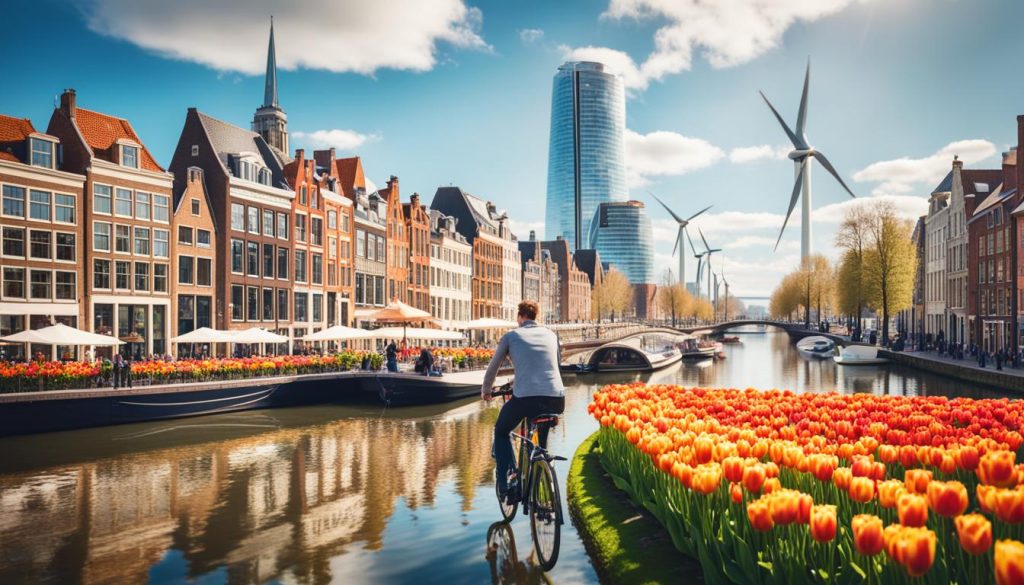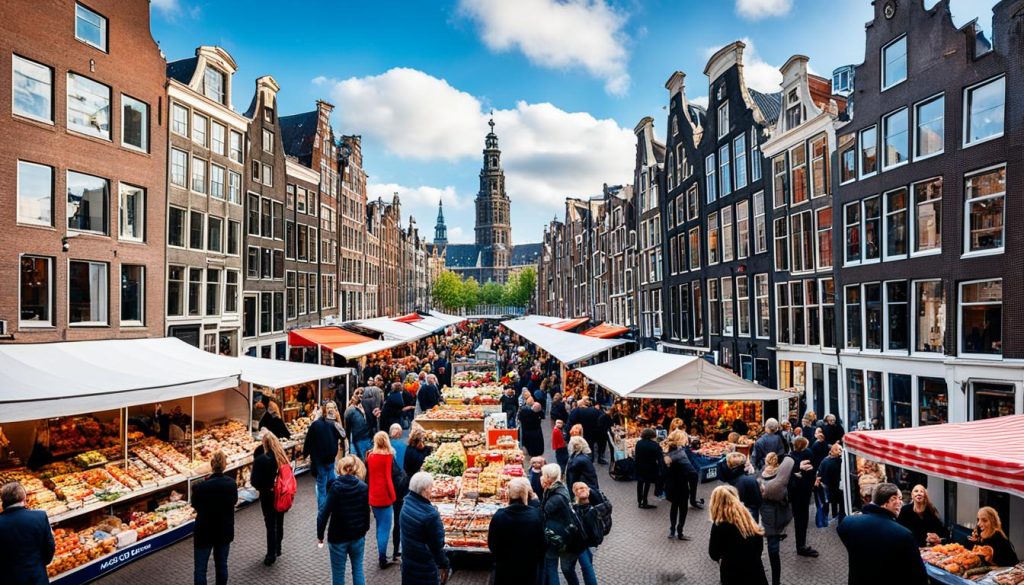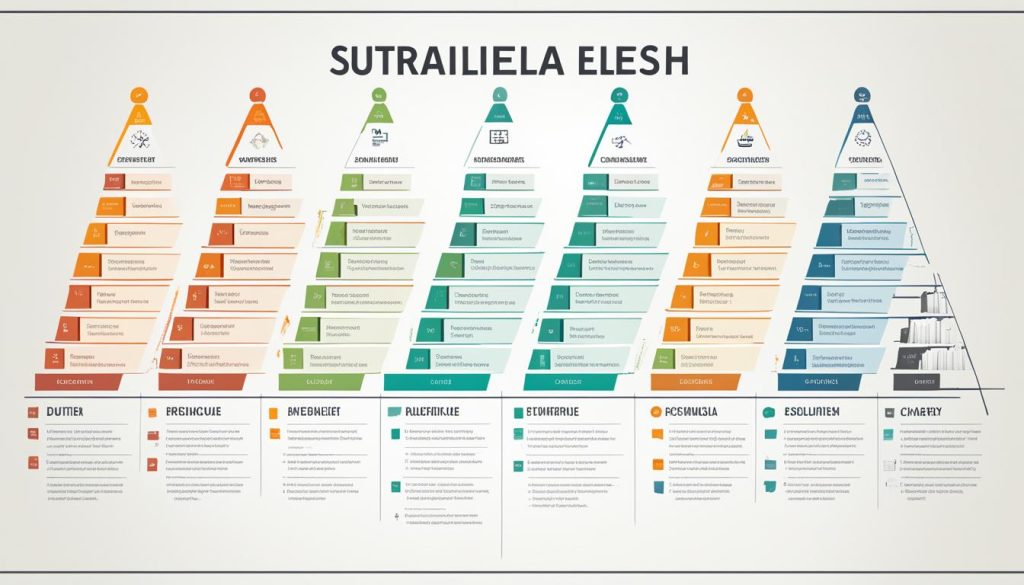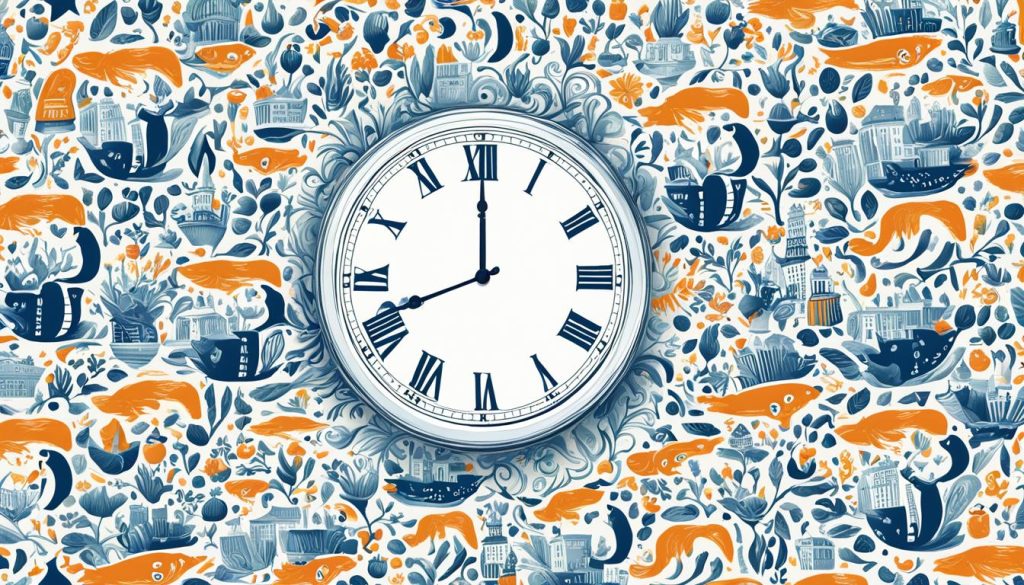The Netherlands excels with a strong economy and talented people. It’s a top spot for big and small businesses alike. This country is a key player in global trade, offering many benefits for starting ventures.
Knowing the local culture and customs is vital for appealing to Dutch consumers. It’s also important to understand the Dutch business scene and statistics. This knowledge aids in making smart choices and building strong international ties.
Key Takeaways
- Strong, thriving economy with a skilled workforce
- Optimal location for international trade and new ventures
- Understanding cultural nuances is key to success
- Knowledge of Dutch trade norms is crucial
- Insight into business trends supports strategic decision-making
Introduction to the Netherlands Business Environment

The Netherlands is known for its robust economy and welcoming business culture. This draws entrepreneurs from all over the world. Its key role in global trade opens doors for countless opportunities, highlighting its importance in Dutch international trade. Understanding the Dutch business scene’s formal and informal aspects is crucial to succeed.
Brief Overview
For those looking to start a business in the Netherlands, a detailed plan and knowledge of local customs are needed. The country boasts a strong infrastructure and a skilled workforce. Its strategic position is vital for Dutch international trade. Knowing these factors can lead entrepreneurs to take advantage of the many available opportunities.
Importance of Understanding Local Customs
Success in the Netherlands hugely depends on cultural intelligence. The Dutch value professionalism and effective cross-cultural interactions. To fit into their business culture, adapting to their professional standards is key. This plays a major role in the success of businesses in the Netherlands.
Quick Netherlands Statistics
The Netherlands offers detailed info on its society and economy. This info is great for businesses and investors looking to join this lively market.
Population and Language
About 17.8 million people live in the Netherlands. Dutch is the main language, adding to its rich culture. English is widely spoken too, helping international businesses to grow.
Economic Indicators
The Dutch economy is strong, with a GDP of $1.1 trillion. This makes the Netherlands a key player globally. The average income per person is $62,000, showing the country’s wealth. The unemployment rate is very low at 3.5%, meaning most people have jobs.
Main Industries
The Netherlands has a variety of key industries. These include:
- Agriculture: It’s a leading exporter of farm goods worldwide.
- Manufacturing: This includes both advanced and traditional factories.
- Tourism: Its historic sites attract many visitors.
- Transportation: Its location makes it a main transport link.
- Logistics: Dutch logistics are known for being very efficient.
These sectors are vital for the Dutch economy. They help in trading both within the country and internationally.
Understanding the Fundamental Business Culture

In the Netherlands, business culture highly prizes professionalism. Skills and knowledge matter more than who you know. This mindset ensures work and personal life stay separate. Business deals are always handled with formality.
Professionalism Over Personal Connections
Dutch business culture values what you can do over who you’re friends with. It keeps things formal to maintain professional distances. This system aims to create a space where your abilities speak loudest.
Punctuality and Professionalism
Being on time is essential in the Netherlands. Meetings are planned well ahead, usually in writing, for clear communication. This respect for punctuality is crucial for good business relationships in the country. It highlights the Dutch focus on efficiency and timekeeping.
Hierarchy and Organisational Structure

In the Netherlands, companies operate differently when it comes to power and structure. They prefer low power distance. This means they share power evenly across the team. Managers trust their teams to use their skills wisely.
Low Power Distance
Low power distance is a big deal in the Netherlands. Managers avoid strict hierarchies to work more as a team. This lets everyone have a say in decisions. It makes sure everyone’s ideas matter, no matter their position.
Inclusiveness and Shared Decision-Making
Being inclusive and making decisions together is key in Dutch companies. It’s normal to use first names, showing everyone is valued the same. This aims to bring new ideas and stronger plans. It shows how everyone working together leads to success.
Working Time Regulations

In the Netherlands, work and personal life balance well together. This balance is thanks to rules that limit work hours while offering flexibility. We’ll explore the key rules in the Netherlands that shape this friendly work environment.
Standard Working Week
The typical work week in the Netherlands is 38 hours, from Monday to Friday, 9 am to 5 pm. But what’s great is workers can sometimes choose different work schedules. This means they can fit work around their lives, not the other way around.
Work-Life Balance
Having time for both work and play is important in the Netherlands. The laws there help people not to work too hard. They limit work to 12 hours a day and 60 hours a week.
People also get at least four weeks of paid leave each year. And they must have 11 hours of rest between work days. This approach helps everyone stay happy and healthy, valuing free time as much as work time.
Business Statistics and Culture in the Netherlands

To really get the Netherlands’ work environment, you need to know the numbers and the culture. The country has strong economic stats. This draws companies from all over the world to set up there.
The way the Dutch do business is unique and important for foreign investors to understand. They like to be straight-talking, on time, and stick to formalities. This makes work go smoothly and keeps things clear.
Looking at the Netherlands’ economy shows it’s doing well. A low jobless rate and a high GDP per capita stand out. This tells us the economy is strong. Work and life balance here is good for everyone involved.
Cultural habits in Dutch workplaces make them welcoming and effective. Getting these customs helps businesses work well in the Netherlands. Knowing about both the culture and the stats is key. It helps foreign businesses fit in and succeed.
Greeting Etiquette

In the Netherlands, the way you greet someone is very important. It sets the tone for your interaction. Knowing the local greeting traditions helps make a good first impression.
Formal and Polite Greetings
When greeting professionally in the Netherlands, start with a firm handshake and look the person in the eye. This shows respect and interest. Always smile and say “Goedemorgen” or “Goedemiddag” with a friendly tone. Doing so conveys politeness and warmth. Keeping this formal approach when meeting someone new in business ensures respect is maintained.
Addressing Individuals
It’s very important how you address people in formal Dutch settings. Customarily, use their surname and title unless told otherwise. For example, say “Meneer Janssen” or “Mevrouw de Vries” to show respect. Switching to first names usually comes later, indicating a more personal connection.
While cheek-kissing is common among Dutch friends or in casual settings, it’s not for work. In a professional setting, stick to handshakes. This keeps the interaction formal and respectful.
Importance of Punctuality

Being punctual is key in Dutch business. It shows you respect other people’s time. It also makes you look professional. In the Netherlands, being on time builds trust and helps everything run smoothly.
Respect for Time
The Dutch believe “Tijd is geld” – “Time is money”. This shows how much they value being punctual. It’s not just about showing up. It’s about being reliable and committed. Being late can damage professional ties.
Practical Tips
- Time Management: Plan your tasks well. Make sure you have enough time for everything to avoid rushing.
- Account for Traffic: Expect traffic jams in cities in the Netherlands. Leave early to be on time.
- Prompt Notification: If you’re running late, tell the people you’re meeting as soon as possible. This helps adjust plans if needed.
Following these tips on being punctual can boost your professionalism. It will improve your business image in the Netherlands.
Typical Meeting Practices

Business meetings in the Netherlands are known for being well-organised and straightforward. Knowing how they work can make your Dutch business dealings much more successful.
Structure and Formality
Being punctual and prepared is key in the Netherlands. Everyone is expected to be on time and understand the agenda in advance. This shows respect and helps the meeting run smoothly.
Meetings there usually start and finish as planned. They value being efficient and respecting everyone’s time. The meetings follow a set format, starting with the last meeting’s minutes then discussing the current agenda.
Direct Communication
Dutch business meetings are known for their straight-talking. People speak openly and back up their points clearly. This approach helps create a clear and open discussion where all views are valued.
To do well in Dutch meetings, it’s important to be upfront yet respectful. Understanding this direct way of talking is crucial.
Communication Style

Learning how the Dutch talk in business is key to doing well in the Netherlands. They are open and honest but also polite. This approach solves problems quickly and makes everything clear.
Directness and Politeness
In Dutch business, saying things clearly is valued. Everyone is encouraged to share their thoughts openly. This helps no matter where you stand in a company. But, it’s important to stay polite while being honest, so feedback is helpful, not hurtful.
Open Communication
Being open in Dutch business means listening to everyone. Meetings are a chance for all to speak up. This makes for a team where everyone feels valued and trust grows.
By using clear Dutch communication, professionals can work better and connect more. Embracing this way of talking helps in achieving success and building strong relationships.
Dress Code in Dutch Business
The dress code in the Netherlands mixes formal and informal styles. It’s key to know this mix when working with Dutch businesses.
Balancing Informal and Formal Attire
Law and finance in the Netherlands stick to formal suits. These fields like traditional styles. But, most sectors prefer casual attire. Jeans and collared shirts are common, showing a blend of comfort and professionalism.
What to Avoid
Even with a relaxed dress code, some things are not okay. Socks with sandals are a big no-no in Dutch offices. Keep it professional, and avoid anything that looks too casual or messy.
The Role of Ethics and Values
In the Dutch business world, ethics and values are crucial. They stem from the nation’s focus on equality and privacy. This creates a unique culture in Dutch workplaces.
Egalitarianism in the Workplace
The Netherlands is famous for treating everyone equally at work, which is a big part of Dutch workplace ethics. Here, everyone, no matter their job or background, gets to have a say. This way, businesses create a space where all opinions matter.
Without strict office hierarchies, everyone can talk openly and make decisions together. It’s normal for everyone, even bosses and their teams, to use first names. This shows a culture of equality and respect.
Privacy and Personal Boundaries
Personal privacy is also key in Dutch workplaces. There’s a clear line between work and personal life. This respects everyone’s need for a balanced life.
The Dutch take care to not pry into each other’s private lives, unless it’s welcomed. This trait is crucial in their way of doing business, showing a strong respect for privacy in the Netherlands.
Insights from Statistics Netherlands (CBS)
The Statistical Office of the Netherlands, known as CBS, is highly regarded for its detailed data collection and analysis. It conducts the Annual Statistics Survey, which gathers essential economic information. This info covers production, workforce dynamics, and corporate finance in various industries. Such data are crucial for businesses and policymakers who need to understand the economic situation in the Netherlands.
Annual Statistics Season
The Annual Statistics Survey by CBS is a well-planned project. It depends on businesses and self-employed people to provide data. This survey collects important information that helps analyse the economy, showing trends and changes in different sectors. Thanks to everyone’s involvement, it gives a complete view of the business environment. This supports smart decision-making across various fields.
Economic Growth Insights
Economic growth is a key interest area for CBS. The insights from their in-depth datasets are very helpful. They combine small-scale industry stats with big-picture economic analysis. This way, CBS paints a clear picture of the Netherlands’ economic path. These findings help businesses, the government, and schools in planning and understanding industry changes. The deep insights from CBS not only benefit the Dutch economy but also help international analysts studying the Dutch market.</=>
FAQ
Q: What advantages does the Netherlands offer for businesses?
Q: Why is it important to understand local customs in the Netherlands?
Q: What are the key statistics about the Netherlands’ business environment?
FAQ
Q: What advantages does the Netherlands offer for businesses?
A: The Netherlands has a booming economy and a talented workforce. It’s great for international trade, making it perfect for starting businesses. Knowing local business trends and norms is key for success.
Q: Why is it important to understand local customs in the Netherlands?
A: Understanding Dutch customs is important to meet the needs of local people. It helps businesses succeed, especially those new to international markets.
Q: What are the key statistics about the Netherlands’ business environment?
A: About 17.8 million people live in the Netherlands, where Dutch is the main language. The economy is strong, with a GDP of
FAQ
Q: What advantages does the Netherlands offer for businesses?
A: The Netherlands has a booming economy and a talented workforce. It’s great for international trade, making it perfect for starting businesses. Knowing local business trends and norms is key for success.
Q: Why is it important to understand local customs in the Netherlands?
A: Understanding Dutch customs is important to meet the needs of local people. It helps businesses succeed, especially those new to international markets.
Q: What are the key statistics about the Netherlands’ business environment?
A: About 17.8 million people live in the Netherlands, where Dutch is the main language. The economy is strong, with a GDP of $1.1 trillion and a low unemployment rate. Agriculture, Manufacturing, Tourism, Transportation, and Logistics are big industries.
Q: How does the Dutch business culture prioritise professionalism?
A: In the Netherlands, skills and work history matter more than who you know. Work is formal, on time, and professional, keeping work and personal life separate.
Q: What is the typical organisational structure within Dutch companies?
A: Dutch firms value fairness and include everyone’s input. Leaders trust their teams, and everyone can share ideas freely, no matter their rank.
Q: What are the standard working hours in the Netherlands?
A: People usually work 38 hours a week, from Monday to Friday, 9 am to 5 pm. Laws prevent working too much, encouraging a balance between work and life.
Q: How should you greet someone in a Dutch business setting?
A: Greet with a firm handshake and look them in the eye. Use last names unless you’re closer. Save cheek-kissing for friends.
Q: Why is punctuality important in Dutch business culture?
A: Being on time shows respect and professionalism. Being late can hurt your reputation, as the Dutch believe “Time is money”.
Q: What are common practices for meetings in the Netherlands?
A: Meetings are well-planned and start on time. They like to stick to the agenda and value everyone’s opinions, expecting honest conversations.
Q: How do Dutch professionals communicate?
A: Direct and polite, that’s how the Dutch communicate. They value clear talks and openness, which helps in doing business and building relationships.
Q: What is the typical dress code in Dutch businesses?
A: Lawyers and bankers dress up, but many sectors are more casual. Jeans and shirts are common, but avoid socks with sandals at work.
Q: What are the core ethics and values in Dutch workplaces?
A: The Dutch value equality and openness, and they keep work and personal life separate. Respect for privacy is important, ensuring everyone feels respected.
Q: What role does Statistics Netherlands (CBS) play in the business environment?
A: CBS gathers economic data on various sectors every year. This information helps businesses, the government, and scholars to plan and understand market trends.
.1 trillion and a low unemployment rate. Agriculture, Manufacturing, Tourism, Transportation, and Logistics are big industries.
Q: How does the Dutch business culture prioritise professionalism?
A: In the Netherlands, skills and work history matter more than who you know. Work is formal, on time, and professional, keeping work and personal life separate.
Q: What is the typical organisational structure within Dutch companies?
A: Dutch firms value fairness and include everyone’s input. Leaders trust their teams, and everyone can share ideas freely, no matter their rank.
Q: What are the standard working hours in the Netherlands?
A: People usually work 38 hours a week, from Monday to Friday, 9 am to 5 pm. Laws prevent working too much, encouraging a balance between work and life.
Q: How should you greet someone in a Dutch business setting?
A: Greet with a firm handshake and look them in the eye. Use last names unless you’re closer. Save cheek-kissing for friends.
Q: Why is punctuality important in Dutch business culture?
A: Being on time shows respect and professionalism. Being late can hurt your reputation, as the Dutch believe “Time is money”.
Q: What are common practices for meetings in the Netherlands?
A: Meetings are well-planned and start on time. They like to stick to the agenda and value everyone’s opinions, expecting honest conversations.
Q: How do Dutch professionals communicate?
A: Direct and polite, that’s how the Dutch communicate. They value clear talks and openness, which helps in doing business and building relationships.
Q: What is the typical dress code in Dutch businesses?
A: Lawyers and bankers dress up, but many sectors are more casual. Jeans and shirts are common, but avoid socks with sandals at work.
Q: What are the core ethics and values in Dutch workplaces?
A: The Dutch value equality and openness, and they keep work and personal life separate. Respect for privacy is important, ensuring everyone feels respected.
Q: What role does Statistics Netherlands (CBS) play in the business environment?
A: CBS gathers economic data on various sectors every year. This information helps businesses, the government, and scholars to plan and understand market trends.







